| Srl | Item |
| 1 |
ID:
107184
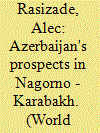

|
|
|
| 2 |
ID:
106106


|
|
|
| 3 |
ID:
156107
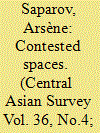

|
|
|
|
|
| Summary/Abstract |
This article deals with the political manipulation of symbolic landscape, using post-Soviet Azerbaijan as a case study. In particular, it looks at the practice of toponym changes as an element of political legitimization and national identity-making. The political use and manipulation of place-names and symbolic landscape is a relatively recent phenomenon that became particularly widespread in the twentieth century. It is widely used for ideological or nationalist purposes throughout the world – from Iran to Israel, from former Yugoslavia to the USSR. However, I argue that post-Soviet Azerbaijan represents an unusual case where one can clearly see strikingly different patterns of place-name manipulation in the pursuit of political legitimacy. It argues that while questions of political legitimacy and nationalism found their reflection in the policy of place-name manipulation, their uses followed clearly different routes and were confined to separate areas.
|
|
|
|
|
|
|
|
|
|
|
|
|
|
|
|
| 4 |
ID:
095123
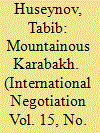

|
|
|
|
|
| Publication |
2010.
|
| Summary/Abstract |
This article analyzes the Karabakh conflict's peace process and suggests a set of approaches to guide future progress. Proceeding from an interest-based framework, the research examines ways to reconcile the power, rights and interests of the conflicting parties. It is argued that a serious shift in the approaches and policies of both the conflicting parties and also the mediators is needed to achieve a breakthrough in the talks. In broader and long-term perspective, stable and sustainable conflict resolution requires the establishment of a power-sharing arrangement that would be based on equal and horizontal relationships between Armenians and Azeris at both sub-national (Mountainous Karabakh), and national (Azerbaijan) levels, and combines this power-sharing arrangement with regional integration.
|
|
|
|
|
|
|
|
|
|
|
|
|
|
|
|
| 5 |
ID:
138251
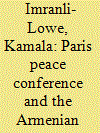

|
|
|
|
|
| Summary/Abstract |
The South Caucasus, which includes Armenia, Azerbaijan and Georgia, is one of the most challenging regions in the world, owing to its long-lasting and ongoing conflicts. One of these conflicts is between Armenia and Azerbaijan, the current stage of which has continued for 25 years without any prospect of a settlement in the near future. For a better understanding of this conflict it is necessary to go back to 1918 and 1919, which witnessed the emergence of the first Azerbaijan and Armenian Republics. The article examines and assesses the ethnic, historical, economic, geographical and security arguments submitted by the Armenian government to the Paris Peace Conference in 1919 to substantiate its vision of territorial delimitation between Armenia and Azerbaijan regarding Garabagh. The article argues that Armenian nationalism was ethnic nationalism and that the Armenian government constructed politically motivated arguments to substantiate its claims to Garabagh, which were part of its nationalist aim of constructing an Armenian ‘ethno-nation’ in the area from the Mediterranean to Garabagh.
|
|
|
|
|
|
|
|
|
|
|
|
|
|
|
|
| 6 |
ID:
191076
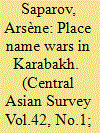

|
|
|
|
|
| Summary/Abstract |
Place names play important ideological role in the modern Armenian–Azerbaijani conflict over Karabakh. Both sides use toponymic evidence to claim a prior occupation of the disputed territory. Azerbaijan relies on the Russian maps to prove that the Armenian population are recent newcomers. Armenians point out to the medieval documents to prove the opposite. This article attempts to reconcile the contradictory evidence used by both sides by looking at the transformation of place-naming practises in the wake of the emergence of a modern bureaucratic state.
I argue that before the rise of modern bureaucratic state in Europe the place-naming was not within the realm of the state interest. The Russian conquest brought the uniformity of toponymic landscape into Caucasus where several toponymic landscapes coexisted in time and space. This resulted in elevation of one landscape into an official landscape and silencing of the other.
|
|
|
|
|
|
|
|
|
|
|
|
|
|
|
|
| 7 |
ID:
095131
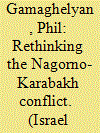

|
|
|
|
|
| Publication |
2010.
|
| Summary/Abstract |
This article builds on the author's research concerning the role of collective memory in identity-based conflicts, as well as his practical work as the co-director of the Imagine Center for Conflict Transformation and as a trainer and facilitator with various Azerbaijani-Armenian dialogue initiatives. It is not a comprehensive study of the Nagorno-Karabakh conflict, but presents a general overview of the Nagorno-Karabakh peace process, what has contributed to its failure, and which areas require major rethinking of conventional approaches. The discussion does not intend to present readers with a set of conclusions, but to provide suggestions for further critical research.
|
|
|
|
|
|
|
|
|
|
|
|
|
|
|
|